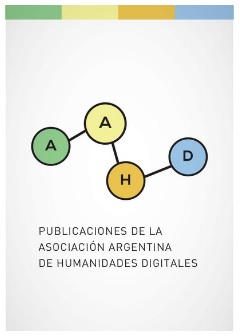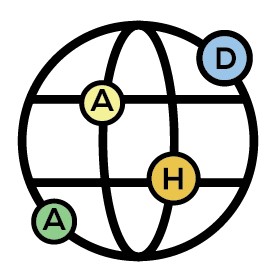Natural Laboratories: an Approach from the Digital Humanities to their Scientific Output in Chile and Argentina between 2011 and 2021
DOI:
https://doi.org/10.24215/27187470e039Keywords:
natural laboratories, Digital Humanities, distant reading, Sociology of scientific knowledge, scientific outputAbstract
The aim of this article is to route an approximation to the scientific output on natural laboratories carried out in Chile and Argentina between 2011 and 2021 using the approach of digital humanities, namely distant reading and its operationalization with Voyant Tools. Abstracts of papers published during the study period and stored in the Web of Science repository are analyzed. The following document is presented in four sections: The first one outlines the concept of laboratory from the sociology of scientific knowledge, explores the concept of natural laboratory, the necessity of deepening the study of their implications beyond the merely scientific ones, and the relevance of this concept in the Chile-Argentina context. The second section sets out the methodology, and the third one describes the main results. Finally, in the fourth section, it is concluded that natural laboratories are a space for research and not an object of study themselves.
Downloads
References
Aguilera, J. M., y Larrain, F. (2021). Natural laboratories in emerging countries and comparative advantages in science: Evidence from Chile. Review Of Policy Research, 38(6).
Braun, M., Briones, I., e Islas, G. (2019). Interlocking directorates, access to credit, and business performance in Chile during early industrialization. Journal Of Business Research, 105(53).
Bucchi, M. (2004). Science in Society: An introduction to social studies of science. Routledge.
Bustillos, J., Romero, J. E., Troncoso, L., y Guevara, A. (2016). Tephra fall at Tungurahua Volcano (Ecuador)-1999-2014: An Example of Tephra Accumulation from a Long-lasting Eruptive Cycle. Geofísica Internacional, 55(40).
Chew, S. H., Huang, W., y Li, X. (2021). Does haze cloud decision making? A natural laboratory experiment. Journal of Economic Behavior and Organization, 182, 132–161.
Cutcliffe, S. (2003). Ideas, Máquinas y Valores. Antropos Editorial.
CNID. (2015). Laboratorios naturales en Chile: Potencialidades de la Antártica chilena. Consejo Nacional para la Innovación y Desarrollo. https://api.observa.minciencia.gob.cl/api/datosabiertos/download/?handle=123456789/537&filename=Región-Subantártica-Impulsora-de-desarrollo-e-innovación-2015.pdf
De Martini, P. M., Bruins, H. J., Feist, L., Goodman-Tchernov, B. N., Hadler, H., Lario, J., Mastronuzzi, G., Obrocki, L., Pantosti, D., Paris, R., Reicherter, K., Smedile, A., y Vött, A. (2021). The Mediterranean Sea and the Gulf of Cadiz as a natural laboratory for paleotsunami research: Recent advancements. Earth-Science Reviews, 216.
Egan, V. (2021). Sexual behaviour as a natural laboratory for understanding individual differences. Personality and Individual Differences, 169.
Guridi, J. A., Pertuze, P. D. J. A., y Pfotenhauer, P. D. S. M. (2020). Natural laboratories as policy instruments for technological learning and institutional capacity building: The case of Chile’s astronomy cluster. Research Policy, 49(2).
Hennessy, E. (2018). The politics of a natural laboratory: Claiming territory and governing life in the Galápagos Islands. Social Studies of Science, 48(4), 483–506.
Iranzo, J., y Blanco, R. (1998). Sociología del Conocimiento Científico. Centro de Investigaciones sociológicas.
Knorr, K. (1996). ¿Comunidades científicas o arenas transepistémicas de investigación? Una crítica de los modelos cuasi-económicos de la ciencia. Redes, 7(3), 129-160.
Knorr, K. (2005). La Fabricación del Conocimiento: Un Ensayo Sobre el Carácter Constructivista y Contextual de la Ciencia. Universidad Nacional de Quilmes.
Latour, B. y Woolgar, S. (1995). La Vida en el Laboratorio: La Construcción de los hechos científicos. Alianza editorial.
Linch, M. (1985). Art and artifact in laboratory science: A study of Shop Work and Shop Talk in a Research Laboratory. Kegan & Paul.
McKinney, W. (2010). Data structures for statistical computing in Python. Proceedings of the 9th Python in Science Conference, 445.
Medina, E. (1989). Conocimiento y sociología de la ciencia. Centro de Investigaciones Sociológicas.
Sinclair, S., y Rockwell, G. (2016). Voyant Tools. Recuperado el 19 de octubre de 2022 desde: http://voyant-tools.org/
Van Rossum, G., y Drake Jr, F. L. (1995). Python reference manual. Centrum voor Wiskunde en Informatica Amsterdam.
Downloads
Published
How to Cite
Issue
Section
License
Copyright (c) 2022 Manuel Fernando Mora Chepo

This work is licensed under a Creative Commons Attribution-ShareAlike 4.0 International License.
Los autores que publican en esta revista están de acuerdo con los siguientes términos:
- Los artículos publicados en la revista se encuentran disponibles en acceso abierto.
- Los autores conservan los derechos de autor y garantizan a la revista el derecho de ser la primera publicación del trabajo al igual que licenciarlo bajo una Licencia Creative Commons Atribución-CompartirIgual 4.0 Internacional (CC BY-SA 4.0), que permite copiar y redistribuir el material en cualquier medio o formato y remezclar, transformar y construir a partir del material bajo los siguientes términos: debe dar crédito de manera adecuada, brindar un enlace a la licencia, e indicar si se han realizado cambios.
- Los autores pueden depositar el trabajo en un repositorio de preprints, postprints, establecer por separado acuerdos adicionales para la distribución no exclusiva de la versión de la obra publicada en la revista (por ejemplo, situarlo en un repositorio institucional o publicarlo en un libro), con un reconocimiento de su publicación inicial en esta revista.
- Se alienta a los/as autores/as a realizar el depósito de datos en SEDICI, o en cualquier otro repositorio de datos de investigación (como Zenodo, donde la AAHD ha creado un repositorio temático para HUMANIDADES DIGITALES), de manera previa a realizar el envío de la contribución a la revista. De este modo, al remitir el artículo solo se deberá indicar la URL donde se encuentran los datos de investigación.


























